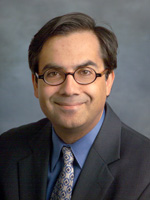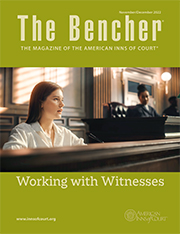Legal Ethics and Witnesses
The Bencher | November/December 2022
By John P. Ratnaswamy, Esquire

 Working with witnesses and potential witnesses is one of the aspects of lawyering that implicates a wide range of legal ethics principles. The following discussion is intended to identify some of the most common ethical concerns, not to be exhaustive. Please also note that many of these topics may be governed in whole or in part by other procedural or substantive law, sometimes possibly including criminal law, and not only by the ethics rules.
Working with witnesses and potential witnesses is one of the aspects of lawyering that implicates a wide range of legal ethics principles. The following discussion is intended to identify some of the most common ethical concerns, not to be exhaustive. Please also note that many of these topics may be governed in whole or in part by other procedural or substantive law, sometimes possibly including criminal law, and not only by the ethics rules.
One threshold question is whether the lawyer can work with the witness. If the witness is the lawyer’s client, then the lawyer must communicate with the client, act competently and diligently, and so on, in accordance with our core notions of what a lawyer does. See, e.g., American Bar Association Model Rules of Professional Conduct (ABA MRPC) 1.4 (“Communication”), 1.1 (“Competence”), 1.3 (“Diligence”).
If the witness is not the lawyer’s client, however, then the ability of the lawyer to communicate with the witness, and whether the lawyer may work with the witness, will or may vary depending on, among other things, whether the witness is an employee of the client, the client’s counterparty or adversary, an employee of that “other side,” an unrepresented person, or a represented person. See, e.g., ABA MRPC 4.3 (“Dealing with Unrepresented Person”); 4.2 (“Communication with Person Represented by Counsel”).
There also are special rules regarding when a lawyer may serve as an occurrence witness, if the lawyer or another lawyer in his or her organization will be serving as an advocate in the same matter. See, e.g., ABA MRPC 3.7 (“Lawyer as Witness”).
A lawyer also should be mindful of limits on discouraging a witness from testifying, as opposed to working with them. See, e.g., ABA MRPC 3.4 (“Fairness to Opposing Party and Counsel”), subsections (a) and (f). Limits might be found in other law as well, possibly including criminal law.
If the lawyer may and is going to work with the witness, the lawyer should be mindful of the differences between proper preparation of a witness and improper coaching a witness, the rules that apply if the lawyer believes that a witness intends to testify falsely, and the rules that apply to a client who is a defendant in a criminal matter. See, e.g., ABA MRPC 1.2 (“Scope of Representation and Allocation of Authority Between Client and Lawyer”), subsection (d); 3.1 (“Meritorious Claims and Contentions”); 3.3 (“Candor Toward the Tribunal”), subsections (a)(3) and (b); 3.4(b); 8.4 (“Misconduct”), subsection (c). Again, limits also might be found in other law, including criminal law.
If the lawyer knows or comes to know that their witness, on the stand, has testified falsely, whether knowingly or not, the lawyer then should consider the rules relating to reasonable remedial measures, including the duration of any obligations of the lawyer. See, e.g., ABA MRPC 3.3(a)(3), (b), and (c). Other law again might be pertinent, too.
Finally, for purposes of this list, a lawyer should be mindful of limits on compensation of witnesses, whether they are occurrence witnesses or expert witnesses, and if or when such principles may apply to a consultant (consulting expert) who will not testify. This subject is another one in which other law as well as ethics rules is likely to be relevant. See, e.g., ABA MRPC 3.4(b), which provides in part that a “A lawyer shall not…offer an inducement to a witness that is prohibited by law[.]” Rule 3.4’s Comment [3] states: “With regard to paragraph (b), it is not improper to pay a witness’s expenses or to compensate an expert witness on terms permitted by law. The common law rule in most jurisdictions is that it is improper to pay an occurrence witness any fee for testifying and that it is improper to pay an expert witness a contingent fee.”
John Ratnaswamy, Esquire, is the founder of The Law Office of John Ratnaswamy LLC in Chicago, Illinois. He also regularly serves as an adjunct professor of legal ethics at the Northwestern University School of Law. Ratnaswamy served as a member of the Hearing Board of the Illinois Attorney Registration & Disciplinary Commission from March 2011 to February 2016. He is a former member of the American Bar Association’s (ABA’s) Standing Committee on Ethics and Professional Responsibility and is the current chair of the ABA Solo, Small Firm, and General Practice Division’s Committee on Ethics and Professional Responsibility. This column should not be understood to represent the views of any of those entities or Ratnaswamy’s or the firm’s current or former clients.